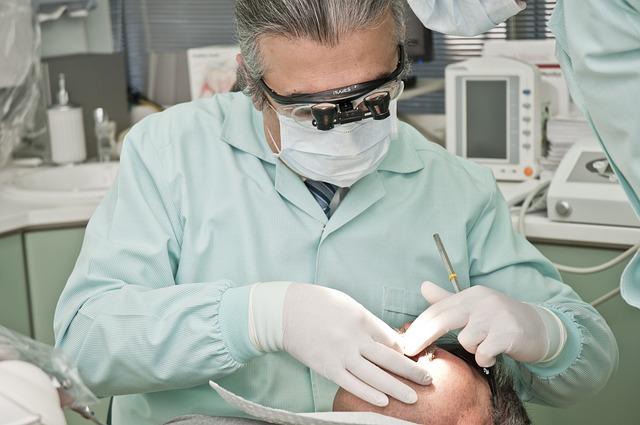Should You Rinse with Salt Water After Tooth Extraction: Guide
Are you scheduled for a tooth extraction? If so, you may be wondering what steps to take to ensure a smooth and comfortable recovery process. One popular suggestion is rinsing with salt water, but is it really beneficial? In this comprehensive guide, we will delve into the topic and provide you with all the necessary information to make an informed decision. So, let’s explore whether rinsing with salt water after tooth extraction is a worthwhile practice or simply an old wives’ tale.
1. Understanding the Benefits of Rinsing with Salt Water after Tooth Extraction
Rinsing with salt water after tooth extraction is a simple yet effective practice that offers numerous benefits for a speedy recovery. Here’s why you should consider incorporating this technique into your post-extraction care routine:
- Promotes healing: Salt water rinses help to cleanse the extraction site, reducing the risk of infection and promoting faster healing. Salt has natural antiseptic properties that can help kill bacteria and prevent the growth of harmful microorganisms.
- Reduces swelling and pain: The gentle saline solution can help alleviate discomfort and swelling that commonly occur after a tooth extraction. It works by reducing inflammation and soothing the affected area, providing much-needed relief.
- Prevents dry socket: One of the most dreaded complications of tooth extraction is dry socket, a condition where the blood clot that forms in the socket becomes dislodged or dissolves prematurely. Rinsing with salt water can help keep the extraction site clean and free from debris, reducing the risk of developing dry socket.
Remember to follow your dentist’s instructions and avoid vigorous rinsing or spitting during the first 24 hours after extraction. After that, gently swish the salt water in your mouth for about 30 seconds, then spit it out. Repeat this process several times a day for optimal results.

2. Step-by-Step Guide: How to Rinse with Salt Water for Optimal Healing after Tooth Extraction
Salt water rinses are a simple yet effective way to promote optimal healing after a tooth extraction. Follow this step-by-step guide to ensure you’re doing it correctly:
1. Prepare the saline solution: Dissolve half a teaspoon of salt in eight ounces of warm water. Make sure the water is not too hot, as it can cause discomfort.
2. Take a mouthful of the salt water solution and swish it around gently in your mouth for about 30 seconds. Be careful not to gargle or swallow the mixture.
3. Spit out the solution into the sink. Avoid rinsing with excessive force, as it may dislodge the blood clot from the extraction site.
4. Repeat the rinse three to four times a day, especially after meals and before bedtime. Regular rinsing will help keep the extraction site clean, reduce inflammation, and promote faster healing.
Remember these crucial tips for a successful salt water rinse:
– Use only regular table salt or sea salt. Avoid using iodized salt, as it may irritate the wound.
– Maintain good oral hygiene by brushing your teeth gently, avoiding the extraction site.
– Avoid using mouthwash or commercial rinses, as they may contain alcohol or other irritants that can hinder the healing process.
Following these steps and practicing proper oral care will aid in the healing process, prevent infection, and ensure a smoother recovery after your tooth extraction.
3. Debunking Myths: The Truth about Salt Water Rinse after Tooth Extraction
After a tooth extraction, it is crucial to follow proper post-operative care to ensure a smooth healing process. One common recommendation is a salt water rinse, but there are several myths surrounding its effectiveness. Let’s debunk these misconceptions and uncover the truth about using salt water for oral hygiene after a tooth extraction:
Myth 1: Salt water rinse delays the healing process
Truth: Contrary to popular belief, a salt water rinse can actually promote healing. The saline solution helps clean the extraction site by reducing bacteria and preventing infection. It also aids in reducing inflammation and soothing any discomfort or swelling that may occur. Consulting your dentist for the appropriate saline concentration is crucial to ensure optimal results.
Myth 2: Salt water rinse is unnecessary if using prescribed mouthwash
Truth: While prescribed mouthwash can be beneficial, it does not make a salt water rinse redundant. Salt water has unique properties that help draw out impurities and promote natural healing. It is a cost-effective and easily accessible alternative that can be used in conjunction with prescribed mouthwash to enhance oral hygiene during the recovery period.
Myth 3: Salt water rinse should be done immediately after extraction
Truth: It is essential to wait until the initial blood clot forms before attempting a salt water rinse. Typically, this occurs 24 hours after the tooth extraction. Rinsing too early can dislodge the clot, leading to a painful condition known as dry socket. It is crucial to follow your dentist’s instructions and seek professional advice before starting any post-operative oral hygiene routine.

4. The Healing Powers of Salt Water: Why Dentists Recommend Rinsing after Tooth Extraction
After undergoing a tooth extraction, the last thing you want is to experience complications or prolonged discomfort. That’s why dentists often recommend rinsing your mouth with saltwater as part of the post-extraction care routine. This simple yet effective practice can help expedite the healing process and promote optimal oral health. Let’s delve into the reasons why dentists emphasize the importance of saltwater rinses:
- Reduced swelling and inflammation: Saltwater acts as a natural anti-inflammatory agent, soothing the surgical site and minimizing swelling. It helps to cleanse the area, removing any bacteria or debris that may have accumulated.
- Promotion of blood clot formation: Rinsing with saltwater aids in the formation of blood clots, which are crucial for proper healing. These clots protect the extraction site, preventing excessive bleeding and reducing the risk of infection.
- Antimicrobial properties: Saltwater has antimicrobial properties that can help kill bacteria and prevent infection. By rinsing with saltwater, you are effectively cleansing the area and reducing the risk of post-extraction complications.
Remember, it is essential to follow your dentist’s instructions precisely when it comes to saltwater rinses after a tooth extraction. The recommended frequency and duration may vary depending on your specific case. By incorporating this simple practice into your post-extraction care routine, you can support the healing process and ensure a smooth recovery.
5. Salt Water Rinse vs. Regular Mouthwash: Which is Better for Post-Extraction Care?
When it comes to post-extraction care, choosing the right mouthwash can make a significant difference in the healing process. Two commonly used options are salt water rinse and regular mouthwash. Let’s take a closer look at both to determine which one is better for your needs.
Salt Water Rinse:
A salt water rinse is a natural and cost-effective option that can help soothe the extraction site and promote healing. Here are some benefits of using a salt water rinse:
- Reduces inflammation: Salt has natural anti-inflammatory properties that can alleviate swelling and discomfort.
- Kills bacteria: Salt water acts as a mild antiseptic, helping to eliminate harmful bacteria in the mouth.
- Safe for sensitive gums: Salt water is gentle on sensitive gums, making it a suitable choice for those with oral sensitivity.
Regular Mouthwash:
Regular mouthwash, on the other hand, is a commercially available product specifically designed for oral hygiene. Here are some advantages of using regular mouthwash for post-extraction care:
- Freshens breath: Mouthwash often contains ingredients that leave your mouth feeling fresh and clean.
- Kills germs: Many mouthwashes have antibacterial properties that can effectively kill harmful bacteria in your mouth.
- Convenience: Commercial mouthwashes are readily available in most stores and pharmacies, providing a convenient option for post-extraction care.
Ultimately, the choice between a salt water rinse and regular mouthwash depends on your specific needs and preferences. Consulting with your dentist or oral surgeon can help you make an informed decision based on your unique circumstances. Remember to always follow their instructions for the best results and a successful recovery.
6. Achieving Optimal Oral Hygiene: The Role of Salt Water Rinse in Preventing Infections after Tooth Extraction
The use of a salt water rinse can play a crucial role in preventing infections after undergoing a tooth extraction procedure. This simple and effective technique has been utilized for centuries due to its numerous benefits. By creating a saline solution with warm water and salt, you can promote optimal oral hygiene and support the healing process. Here are some key reasons why incorporating a salt water rinse into your post-tooth extraction care routine is essential:
- Antibacterial properties: Salt water has natural antibacterial properties that can help eliminate harmful bacteria from the extraction site. This reduces the risk of infection and promotes a healthy healing process.
- Reduced inflammation: Salt water has anti-inflammatory effects, which can help reduce swelling and discomfort in the mouth after a tooth extraction. It can provide soothing relief and aid in the healing of the surrounding tissues.
- Gentle cleansing: A salt water rinse acts as a gentle cleanser for the area around the extraction site. It helps remove food particles and debris, preventing the accumulation of bacteria and promoting a clean environment for healing.
It is important to note that a salt water rinse should be used in addition to, not as a substitute for, proper oral hygiene practices. Following your dentist’s instructions and maintaining good oral care habits, such as brushing your teeth gently and avoiding strenuous rinsing, will further support optimal oral hygiene during the recovery period.
7. Expert Insights: Dentists Share their Perspectives on Rinsing with Salt Water after Tooth Extraction
When it comes to caring for your mouth after a tooth extraction, dentists hold a wealth of knowledge. We reached out to several dental professionals to gather their expert insights on the topic of rinsing with salt water post-extraction. Here’s what they had to say:
1. Dr. Sarah Thompson, DDS
“Rinsing with salt water can be a beneficial practice after a tooth extraction. The saltwater solution helps cleanse the wound and promotes healing. It also has anti-inflammatory properties that can reduce swelling and discomfort. However, it’s important to remember not to rinse too vigorously, as this could dislodge the blood clot and delay the healing process.”
2. Dr. Mark Johnson, DMD
“Salt water rinses are a popular choice for post-extraction care due to their natural healing properties. The salt helps create an environment that discourages bacterial growth, reducing the risk of infection. It’s best to use a warm saline solution, as it can soothe the area and improve blood circulation, aiding in faster healing. Just remember to follow your dentist’s instructions and avoid vigorous rinsing or spitting to protect the blood clot formation.”
3. Dr. Jennifer Lee, DDS
“Salt water rinses can play a vital role in maintaining oral hygiene after a tooth extraction. The gentle saline solution can help flush out debris and food particles from the extraction site, preventing infection and promoting healing. It’s important to note that salt water rinses are not a substitute for proper oral care, so continue brushing gently around the area and follow your dentist’s post-extraction instructions for a successful recovery.”
These insights from dental professionals demonstrate the consensus among experts regarding the benefits of rinsing with salt water after tooth extraction. However, always consult with your dentist for personalized advice based on your specific needs and situation.
8. Dos and Don’ts: Important Tips for Effective Salt Water Rinsing after Tooth Extraction
When it comes to salt water rinsing after a tooth extraction, there are certain dos and don’ts that you should keep in mind for effective healing. Following these important tips will help you ensure a smooth recovery process:
- Do: Use warm water: It is recommended to use warm water when preparing your salt water rinse. This helps in dissolving the salt more effectively and provides a soothing sensation.
- Do: Rinse gently: Be gentle while rinsing your mouth with the salt water solution. Vigorous rinsing can disrupt the blood clot that forms in the extraction site, leading to complications.
- Do: Rinse after meals: After eating, it is crucial to rinse your mouth with the salt water solution to remove any food particles and bacteria that may have accumulated around the extraction site.
- Don’t: Use table salt: Avoid using table salt for your salt water rinse as it contains additives that can be harmful to your healing process. Instead, opt for natural sea salt or non-iodized salt.
- Don’t: Spit forcefully: While spitting after rinsing, do not spit forcefully as it can dislodge the blood clot and delay the healing process. Gently let the solution out of your mouth instead.
- Don’t: Skip rinsing: Salt water rinsing is a vital part of the post-tooth extraction care routine. Skipping this step can increase the risk of infection and prolong the healing time.
By following these dos and don’ts, you can ensure that your salt water rinsing after tooth extraction is effective and promotes a speedy recovery. Always consult with your dentist for specific instructions tailored to your individual case.
9. Exploring the Scientific Evidence: How Salt Water Rinse Enhances the Healing Process after Tooth Extraction
When it comes to enhancing the healing process after tooth extraction, salt water rinse has been backed by scientific evidence as an effective method. Here’s what the research tells us:
1. Reduces inflammation: Salt water rinse helps to reduce inflammation in the extraction site. The saline solution acts as a mild antiseptic and helps to flush out any bacteria or debris that may be present, preventing infection and promoting faster healing.
2. Promotes blood circulation: Salt water rinse improves blood circulation in the gums, which aids in the delivery of essential nutrients and oxygen to the healing tissues. This increased blood flow accelerates the healing process and reduces the risk of complications.
3. Soothes discomfort: The gentle swishing of salt water can provide temporary relief from discomfort and pain associated with tooth extraction. It acts as a natural analgesic, reducing inflammation and numbing the area temporarily.
Overall, the scientific evidence strongly supports the use of salt water rinse as an effective method to enhance the healing process after tooth extraction. It is a simple and natural approach that can be easily incorporated into post-extraction oral care routines, providing numerous benefits for a smoother recovery.
10. Making an Informed Choice: Considering the Pros and Cons of Salt Water Rinse after Tooth Extraction
When it comes to post tooth extraction care, one option that many dentists recommend is a salt water rinse. This simple and natural remedy can help promote healing and reduce the risk of infection. However, it’s important to consider both the pros and cons before deciding if it’s the right choice for you.
Pros of Salt Water Rinse:
- Promotes healing: Salt water has natural antibacterial properties that can help prevent infection and promote healing of the extraction site.
- Reduces swelling and pain: Rinsing with salt water can help reduce swelling and relieve pain associated with the extraction.
- Easy and cost-effective: Salt water rinse is a simple and affordable option that can be done at home without any special equipment.
Cons of Salt Water Rinse:
- Potential for overuse: While salt water rinse can be beneficial, using it too frequently or for too long can actually hinder the healing process and cause irritation.
- Taste and discomfort: Some people may find the taste and sensation of salt water rinse unpleasant or uncomfortable.
- Not suitable for everyone: Individuals with certain medical conditions, such as high blood pressure or a compromised immune system, should consult with their dentist before using a salt water rinse.
Ultimately, the decision to use a salt water rinse after tooth extraction should be based on your individual needs and preferences. It’s always best to consult with your dentist for personalized advice and guidance.
Frequently Asked Questions
Q: Should I rinse with salt water after tooth extraction?
A: Yes, rinsing with salt water can be beneficial after tooth extraction.
Q: Why is rinsing with salt water recommended?
A: Salt water can help promote healing and prevent infection in the extraction site.
Q: How does salt water aid in the healing process?
A: Salt water creates an environment that is not conducive to the growth of bacteria, reducing the risk of infection. Additionally, it can help soothe the area and alleviate discomfort.
Q: How do I prepare salt water solution for rinsing?
A: To prepare a salt water solution, dissolve half a teaspoon of salt in eight ounces of warm water.
Q: How frequently should I rinse with salt water?
A: It is generally recommended to rinse with salt water after meals and before bed, or as advised by your dentist or oral surgeon.
Q: Are there any precautions to consider when rinsing with salt water?
A: Yes, it is important to avoid vigorous rinsing or spitting forcefully to prevent dislodging the blood clot that forms in the extraction site.
Q: Can I use any type of salt for the solution?
A: It is best to use non-iodized salt for preparing the solution, as iodized salt may contain additives that can irritate the extraction site.
Q: How long should I continue rinsing with salt water?
A: Typically, it is recommended to continue rinsing with salt water for about a week following the tooth extraction. However, it’s essential to follow the specific instructions provided by your dentist or oral surgeon.
Q: Are there any alternatives to salt water rinse after tooth extraction?
A: Yes, your dentist or oral surgeon may recommend alternative mouth rinses or prescribe specific medicated solutions to aid in the healing process. It’s important to consult with your dental professional for personalized advice.
Q: Should I seek professional advice if I experience any complications or concerns?
A: Absolutely, if you have any concerns or experience any complications, it is crucial to reach out to your dentist or oral surgeon immediately. They will be able to provide the necessary guidance and address any issues that may arise.
In Summary
In conclusion, rinsing with salt water after a tooth extraction can be a beneficial practice. By creating a saline solution, you can effectively cleanse the surgical site, reduce bacteria, and promote healing. However, it is crucial to follow the proper guidelines and consult your dentist for personalized advice. Remember, salt water rinses should be gentle, and excessive force should be avoided to prevent any potential complications. Keep in mind that while salt water rinses can provide relief, they are not a substitute for professional dental care. By incorporating this simple yet effective technique into your post-extraction care routine, you can aid in the healing process and ensure a smoother recovery.






